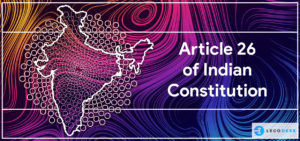Article 26 of Indian Constitution

The hallmark of any democratic state is its ability to ensure that all the people who constitute that State has freedom of conscience so that persons of different faith have the same rights and responsibilities and no discrimination between them exists. Secularism is known as this process of growth of reason, which is the basis of any secular and democratic state.
The word ‘secularism’ was not placed in the Indian Constitution when it was first promulgated in 1950. In fact, it was introduced in the Preamble through the 42nd Amendment which came into effect on January 3, 1977. After the Amendment, India was described as a ‘Sovereign Socialist Secular Democratic Republic’ in the Preamble to the Constitution.
Provisions in the Constitution
The principle that people of all religions in India will have equal rights and that they will be free from any discrimination by the State on the grounds of religion is already provided for under Article 15 and Article 16 of the Indian Constitution.
In that regard, the Constituent Assembly still felt like there was a need to introduce two additional provisions to secure religious rights in the form of Article 25 and Article 26 of the Indian Constitution. Freedom of conscience in regard to religion and the rights flowing therein are protected by Articles 25 and 26 of the Indian Constitution. Article 25 says that subject to public order, morality, and health and to the other provisions relating to Fundamental Rights, all persons are equally entitled to freedom of conscience and the right to freely profess, practice and propagate their religion.
Article 26, on the other hand, provides that subject to public order, morality and health, every religious domination shall have the right to establish and maintain institutions for religious and charitable purposes, to manage its own affairs in matters of religion, to own and acquire movable and immovable property, and to administer such property in accordance with law.
Interpretation of Article 26
The meaning of the word ‘denomination’ was accepted by the court for the purpose of Article 26 in Commr H.R.E. v Sri Lakshmindra Thirtha Swamiar of Sri Shirur Mutt[1]. It was said that a ‘religious denomination’ is a collection of individuals grouped together under the same name – a religious sect or body having a common faith and organization and designated by a distinctive name. Further, they are entitled to enjoy complete autonomy in the matter of deciding what rites and ceremonies will govern them, and no outside authority has the power to interfere with their matters.
A very important case concerning the rights of a Hindu religious denomination came up for consideration in 1958[2]. The temple was subjected to a scheme framed under Section 92 of the Civil Procedure Code. The Madras Legislature enacted the Madras Temple Entry Authorization Act to remove the discrimination against Harijans from entering Hindu public temples. Subsequently, the trustees of the time sought a declaration by filing a suit that the Act had no valid application as the temple was a denominational one having been exclusively founded for the Gowda Brahmins. Thus, the Act violated Article 26(b) of the Constitution.
At first instance, the suit was dismissed. The trustees went on appeal to the High Court which passed a limited decree reserving the rights of the trustees to exclude the general public during certain ceremonies only which were exclusively reserved for the Gowda Brahmins. There was a final appeal to the Supreme Court, where the entire scope of the Article was interpreted.
The Supreme Court applied the rule of harmonious construction to hold that Article 26(b) is subject to the right of the State under Article 25(2)(b). In that view, the rights of the Gowda Brahmins to participate in certain ceremonies are denominational rights, and therefore the High Court was correct in granting a decree to that limited extent only. The right that was claimed by the Gowda Brahmins was rejected because it was clearly discriminatory in nature which was prohibited by Article 15 and 16 of the Constitution.
Conclusion
Religion is an extremely sensitive issue in our country – mostly because our country is host to a variety of religions following distinct ethnic practices. But, suspicion and distrust springing from sectarian loyalties and considerations will give birth to further problems and will completely damage the social fabric on which our society is based. Therefore, as far as possible, religion and politics should be separated. The State should be delinked from all religious issues because garnering a vote bank on religion is not uncommon in India. The State cannot favour one religion and exclude the other. Ours is a diverse nation; all sections should at all times feel a sense of belonging to the Indian nation. If that is not achieved, it is close to impossible for our country to achieve progress in any field truly.
[1] 1954 SCR 1005
[2] Venkataramana Devaru v State of Mysore, 1958 SCR 895
Try our Debt Resolution solutions today Request a Demo